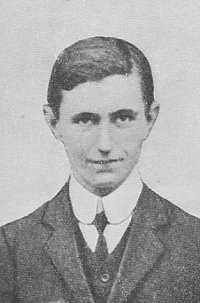
REGINALD ARTHUR CLARKE
Of all those lost in the Great War Reginald Arthur Clarke's connection to Portsmouth is one of the least substantial, having been resident in the Borough for less than five years. He is nevertheless remembered on two important local memorials and as such can legitimately be claimed as being 'from Portsmouth'.
If Reginald Arthur ever thought of a place called home he would probably have been referring to Rushden in Northamptonshire where both he and his father Charles William Clarke were born, in 1895 and 1867 respectively. Charles William's chosen sphere of occupation was journalism and it took him to many places in the UK, including perhaps Northern Ireland as that was where his wife Sarah Ingram McCaw was born. They were married at Hackney in London in 1891.
The family were living in Lewisham when the 1901 census was taken though Reginald Arthur was actually staying with his grandparents, William and Catherine Clarke in Rushden. By 1909 the family had moved to Portsmouth where Charles William had taken a job as an Advertising Manager on one of the local newspapers. The family lived at 82 Festing Grove, Southsea and then included two more sons - William and Charles, born in 1898 and 1901, in Yorkshire and Catford, respectively.

In February of 1909, Reginald Arthur joined the third year course of study at the Secondary School on Victoria Road North having brought with him from Colfe's Grammar School, Lewisham, a particularly good report. In July, 1910, he passed sufficiently well in Honours at the Oxford Senior Local Examination to secure Matriculation at London University. Probably, however, he will be best remembered for his effective rendering of the part of Richard II in the scenes from Shakespeare's play which were given at the Christmas Concert of that year.
From the Secondary School he proceeded to the Municipal College with a Scholarship, but he was unable to take full advantage of this opportunity for a little later the family moved to Sydney, Australia. Then came the war and, being unable to resist the call of the Motherland for help, he and a younger brother, also a past pupil of the School, returned to take their places with the fighting forces.
The little that is known of what happened to Reginald Arthur is from a letter which his brother sent to a friend. It seems that the two brothers, who had both specialised in signalling, found it necessary to send back a message from the front line when no means of doing so remained but to come out into the open. Realising fully the hazard to themselves, but knowing also the vital necessity for getting the message through, they did not hesitate, with the result that Reginald was brought down by the enemy.
FURTHER INFORMATION
The photograph above was taken from a WW1 memorial booklet published by Southern Grammar School. Extracts also appear above.
The Commonwealth War Graves Commission (CWGC) lists Private Reginald Arthur Clarke (6112), Australian Infantry, died on 18/09/1917. Commemorated at the Ypres (Menin Gate) Memorial (Panel 7 - 17 - 23 - 25 - 27 - 29 - 31.). Son of Charles William and Sarah Ingram Clarke. Native of Rushden, Northants, England.
Reginald Clarke is also remembered on the Southern Grammar School WW1 Memorial and on the Cenotaph. He is not listed in the 'National Roll of the Great War'.
Tim Backhouse
June 2014